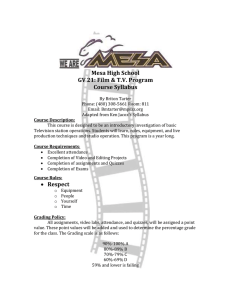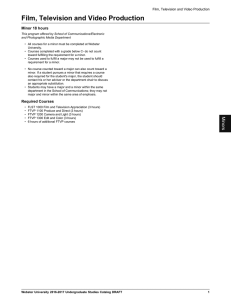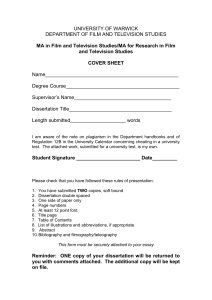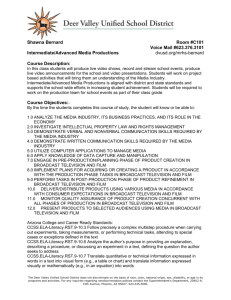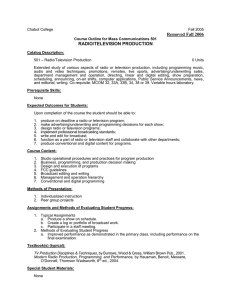Mesa High School GV 20: Film & T.V. Program Course Syllabus
advertisement
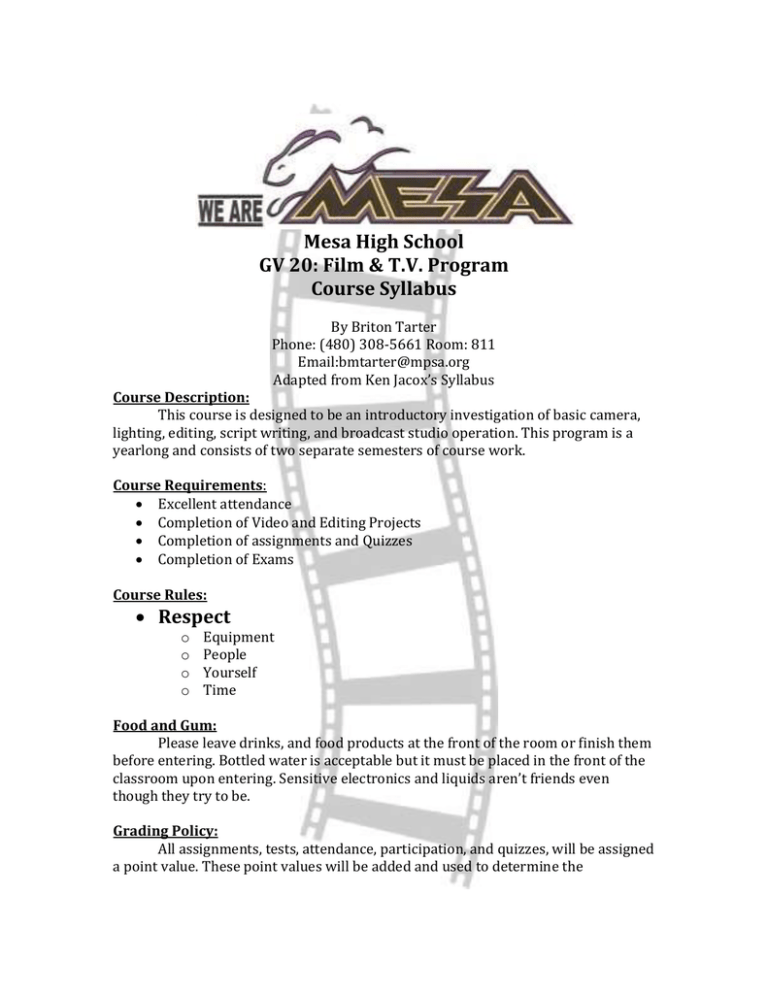
Mesa High School GV 20: Film & T.V. Program Course Syllabus By Briton Tarter Phone: (480) 308-5661 Room: 811 Email:bmtarter@mpsa.org Adapted from Ken Jacox’s Syllabus Course Description: This course is designed to be an introductory investigation of basic camera, lighting, editing, script writing, and broadcast studio operation. This program is a yearlong and consists of two separate semesters of course work. Course Requirements: Excellent attendance Completion of Video and Editing Projects Completion of assignments and Quizzes Completion of Exams Course Rules: Respect o o o o Equipment People Yourself Time Food and Gum: Please leave drinks, and food products at the front of the room or finish them before entering. Bottled water is acceptable but it must be placed in the front of the classroom upon entering. Sensitive electronics and liquids aren’t friends even though they try to be. Grading Policy: All assignments, tests, attendance, participation, and quizzes, will be assigned a point value. These point values will be added and used to determine the 2 percentage grade for the class. Grades are available on synergy and through Canvas. The Grading scale is as follows: 90%-100% A 80%-89% B 70%-79% C 60%-69% D 59% and lower is failing Breakdown of Assignments Homework 10% Tests 20% Participation and Attendance 10% Projects and Assignments 60% Attendance Policy: Students are expected to be in class on time every scheduled class period. If students must be absent, it is the student’s responsibility to contact the teacher concerning makeup work. Work missed due to truancy may not be made up. Students who do not attend 90% of the scheduled class periods will not receive credit. Tardy Policy: Please arrive to class on time. Students who are late to class will be asked to fill out the tardy slip explain the reasoning why. Students who are continually late will be meet on a case-to-case basis to solve the issues. After five tardiness students will be referred to administration. Electronic Devices: Electronic devices are to be turned off and stowed before entering the classroom. All electronic devices will be confiscated after one warning and taken to the office to be picked up at the end of the day. Electronic devices can be used for educational purposes as directed by me. Office Hours: Email is the best way to reach me. I am available Tuesdays and Thursdays after school from 3-5 or by appointment when necessary. Please do not hesitate to contact me with questions or concerns. Course Outcomes: Upon completing this course students will be able to understand a illustrate: Analyze the media industries business practices and economics Understand intellectual property law and rights Demonstrate verbal and nonverbal communication skills related to media production 3 Demonstrate written communication skills required by the media industry Utilize computer applications to manage media Apply knowledge of data capture and manipulation Engage in the pre-production/planning phases of product creation in broadcast television and film Implement plans for acquiring and creating a product in the production phase of broadcast television and film standards Perform post-production phase of broadcast television and film Deliver/distribute products using media in accordance with broadcast television and film standards Monitor quality of products from creation to distribution in accordance with broadcast television and film standards Present products to audiences in accordance to Broadcast television and film standards 4 Mesa High Television and Film Course Outline Unit 1: History, Technology, and Law o Analog vs. Digital o Persistence of vision o Video Formats o Compression and Sampling o HD o Technology Advancements o Legal and Ethical issues in media Unit 2: Safety o Safety Hazards and precautions o Workplace and OSHA requirements o Equipment care and handling Unit 3: TV/Video and Movie Production Impact o Media Paradigm o Media’s impact on society o Purpose of Media o Multimedia influences on people o Internet and the impact it has on media o Responsibility of content delivery Unit 4: Storytelling and Storyboarding o Basic Story Elements o How demographics impact storytelling o Script formats o Storyboarding o Pre-production process Unit 5: Basic Camera/Shot Composition o Parts, Operation, Maintenance o Principles of Light: exposure, lenses o Basic Camera Shots and Moves o Shot Composition Unit 6: Lighting o Principles of Lighting o Indoor/Outdoor Lighting o Outside/Field Lighting o Chroma Key Lighting 5 Unit 7: Audio o Different types of Microphones o Proper Levels (decibels) o Amplification o Sound Waves and files o Use of audio to enhance video Unit 8: Digital Video Editing and Postproduction o Final Cut Pro editing system o Compositing o Multiple formats o Compression Unit 9: Video, TV, and Movie Production Careers o Roles of Video Production o Variety of audio/visual skills o Portfolios and resumes Unit 10: Live Broadcasts o News and Journalism o On location live events o Basics of on-camera talent Unit 11: News Package o Interview Skills o Story-telling skills o Shooting and editing Skills
